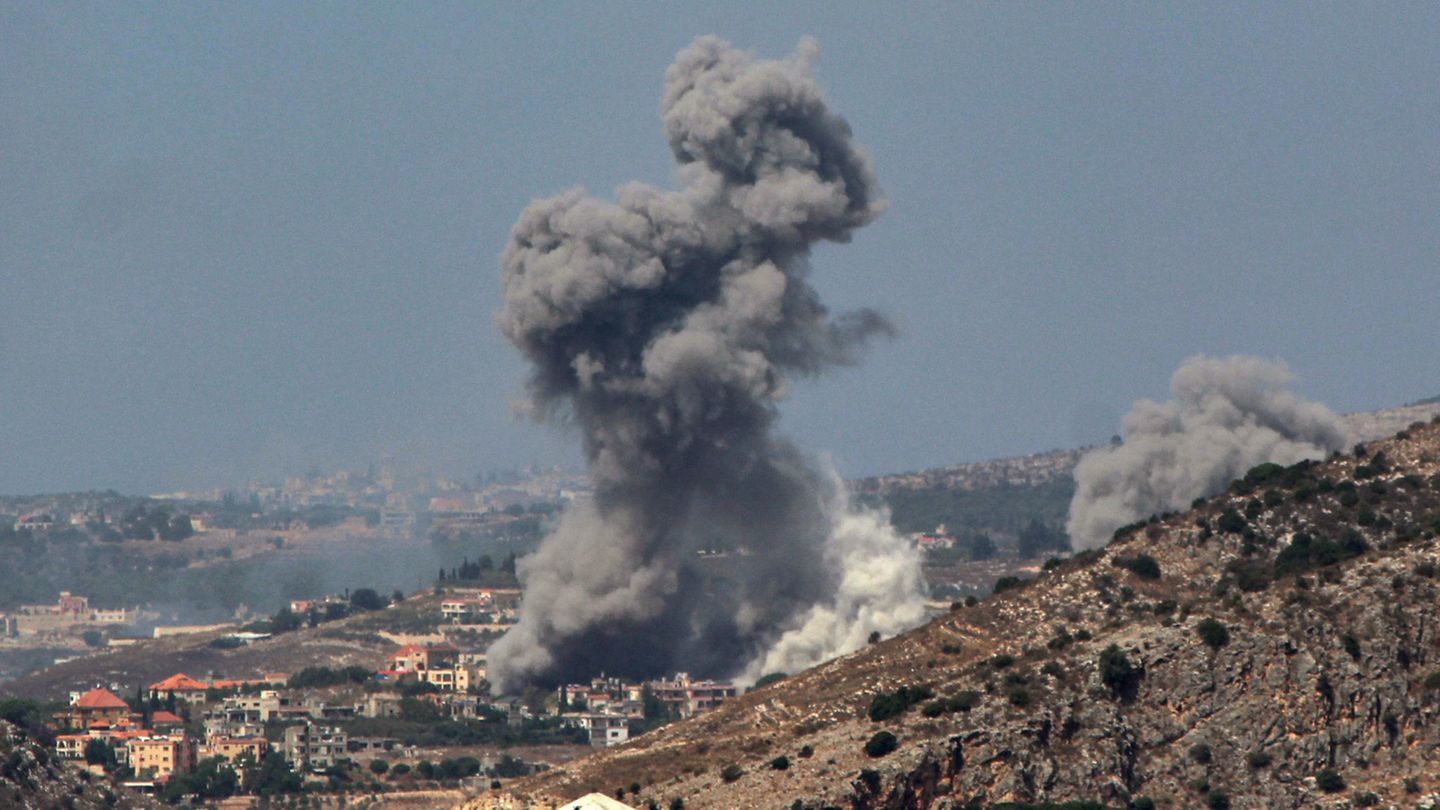Israel has targeted Hezbollah’s infrastructure in southern Lebanon with massive air strikes. The army is already planning further action – without saying what this means.
Israel’s most serious attacks in Lebanon in almost two decades are fueling fears of an uncontrollable escalation in the region. According to the Lebanese Ministry of Health, around 500 people were killed in massive air strikes, including dozens of children – and more than 1,600 were injured. This is the highest number of casualties in southern Lebanon since the last war between Israel and the powerful Hezbollah militia in 2006.
The Israeli military said it attacked around 1,600 targets in Lebanon on Monday – and continued the attacks overnight into Tuesday. According to Israeli reports, the attacks, codenamed “Arrows of the North”, targeted weapons depots belonging to the pro-Iranian Hezbollah militia, which has attacked Israel with around 9,000 rockets and drones since the beginning of October. Some of these depots were located in the private homes of civilians who had been called upon to seek safety before the attacks.
Hezbollah, which acts in Lebanon practically like a state within a state, responded with heavy rocket attacks on Israeli territory. Around 250 missiles were fired from Lebanon, some of which were intercepted by missile defenses and some of which landed in open areas, the Israeli military said. According to media reports, some of these missiles reached much deeper into Israeli territory than ever before since the Hezbollah attacks began.
Hezbollah bombs Israel
There were also strikes in the West Bank for the first time – at a similar distance from Lebanon as the greater Tel Aviv area. Hezbollah said it also targeted arms industry facilities near the port city of Haifa and military bases.
Crisis region
Who is actually pursuing which goal in the Middle East?
Israeli Prime Minister Benjamin Netanyahu addressed a message directly to the Lebanese people: “Israel’s war is not with you, but with Hezbollah,” he said. “Hezbollah has used you as human shields for far too long.” In order to defend Israel against Hezbollah attacks, the militia’s weapons must be rendered harmless, Netanyahu said.
“Panic and chaos” in southern Lebanon
In the south of Lebanon, panic broke out among the people, many fled towards Beirut or other places in the north of the country. Long traffic jams occurred on the roads, schools were converted into emergency shelters. There was “panic and chaos,” eyewitnesses reported. After the bombings in the south, Israel’s air force also attacked positions in the Bekaa Valley in northeastern Lebanon, according to security sources.
After the air strikes, the Israeli government declared a nationwide state of emergency in anticipation of counterattacks. This also means that the size of gatherings can be restricted. During the night, rocket alerts were again triggered in many towns in northern Israel.
Tens of thousands of rockets destroyed?
According to Defense Minister Joav Galant, tens of thousands of Hezbollah rockets were destroyed in the attacks in Lebanon. Before the attacks began on October 8, Hezbollah’s arsenal was estimated at 150,000 rockets, drones and cruise missiles.
Chief of Staff Herzi Halevi said the military was attacking the infrastructure that Hezbollah had built up over the past 20 years for its fight against Israel. His army was already preparing “the next phases” of the fight, he said, without giving details.
Is Israel planning a ground offensive?
So far, Israel has been attacking Lebanon from the air and with artillery across the border. A ground offensive in southern Lebanon would mean a further dangerous escalation of the conflict – and possibly draw other forces allied with Iran even deeper into the war. Israel’s army has so far evaded questions about a possible troop invasion of Lebanon.
Car camera films the impact of a Hezbollah rocket in northern Israel
01:54 min
On October 7, 2023, terrorists from Hamas, an ally of Hezbollah, and other extremist groups killed more than 1,200 people in Israel and took about 250 others hostage in the Gaza Strip. The unprecedented massacre triggered the Gaza War, and since then Hezbollah has been attacking the Jewish neighboring state with rockets almost every day. Israel wants to drive Hezbollah out of the border area in order to ensure the safety of its citizens in the north and to enable displaced people to return.
Lebanon accuses Israel of “war of extermination”
In view of the attacks, the Lebanese government accused Israel of waging “a war of extermination in every sense of the word.” “We as a government are working to stop this new war by Israel and prevent a descent into the unknown,” said caretaker Prime Minister Najib Mikati.
Because of the escalation of the war, the French government requested an emergency meeting of the UN Security Council for this week. However, the most powerful body of the United Nations is itself only able to act to a limited extent due to political conflicts. The general debate of the UN General Assembly, which will last several days, also begins on Tuesday, and the Middle East conflict will play an important role in the foreseeable future. Netanyahu is due to arrive in the second half of the week and is likely to give a combative speech – after all, many UN members are critical or even hostile towards Israel.
Civilians warned of attacks
Israel’s army also reportedly attacked a target in the south of the Lebanese capital Beirut, where Ibrahim Akil, a high-ranking military commander of the militia, was killed on Friday. According to unconfirmed Israeli media reports, the target of the new attack was Hezbollah commander Ali Karaki, who was responsible for the southern front and was supposed to replace Akil. Hezbollah announced after the attack that Karaki was fine. According to the Israeli army, Karaki is one of the few surviving members of the Hezbollah leadership on the military’s “hit list”.
Six dead hostages
Netanyahu apologizes and vows revenge – but the pressure is growing
The civilian population in Lebanon was reportedly warned of the new wave of attacks by automated calls and text messages. According to reports, people were asked to stay away from villages where Hezbollah weapons were stored until further notice. The Lebanese Ministry of Information described the action as “psychological warfare” by Israel.
150,000 people leave border area
Since the latest escalation between Israel and Lebanon, around 150,000 people have had to leave their homes on both sides of the border. The warlike conflict has intensified again after the explosion of thousands of radio devices in Lebanon and an Israeli attack on the Hezbollah leadership near Beirut that left more than 50 people dead last week. Israel’s army has once again expanded its attacks in the neighboring country, which also left dozens dead and injured.
Israel and Hezbollah already waged war against each other in 1982 and 2006. The militia is now much more heavily armed than during the war almost 20 years ago. According to its own statements, it is acting in solidarity with Hamas, which is fighting against Israel in the Gaza Strip and is also supported by Iran.
Israel’s military has recently reduced the number of its attacks in the Gaza Strip and is increasingly concentrating on Hezbollah. The aim is to get the militia to withdraw behind the Litani River, 30 kilometers from the border – as stipulated in UN Resolution 1701, which marked the end of the war in 2006. According to the resolution, Hezbollah is not allowed to have a presence along the border. However, this is not being enforced by either the UN observer mission or the Lebanese army.
Source: Stern
I have been working in the news industry for over 6 years, first as a reporter and now as an editor. I have covered politics extensively, and my work has appeared in major newspapers and online news outlets around the world. In addition to my writing, I also contribute regularly to 24 Hours World.




